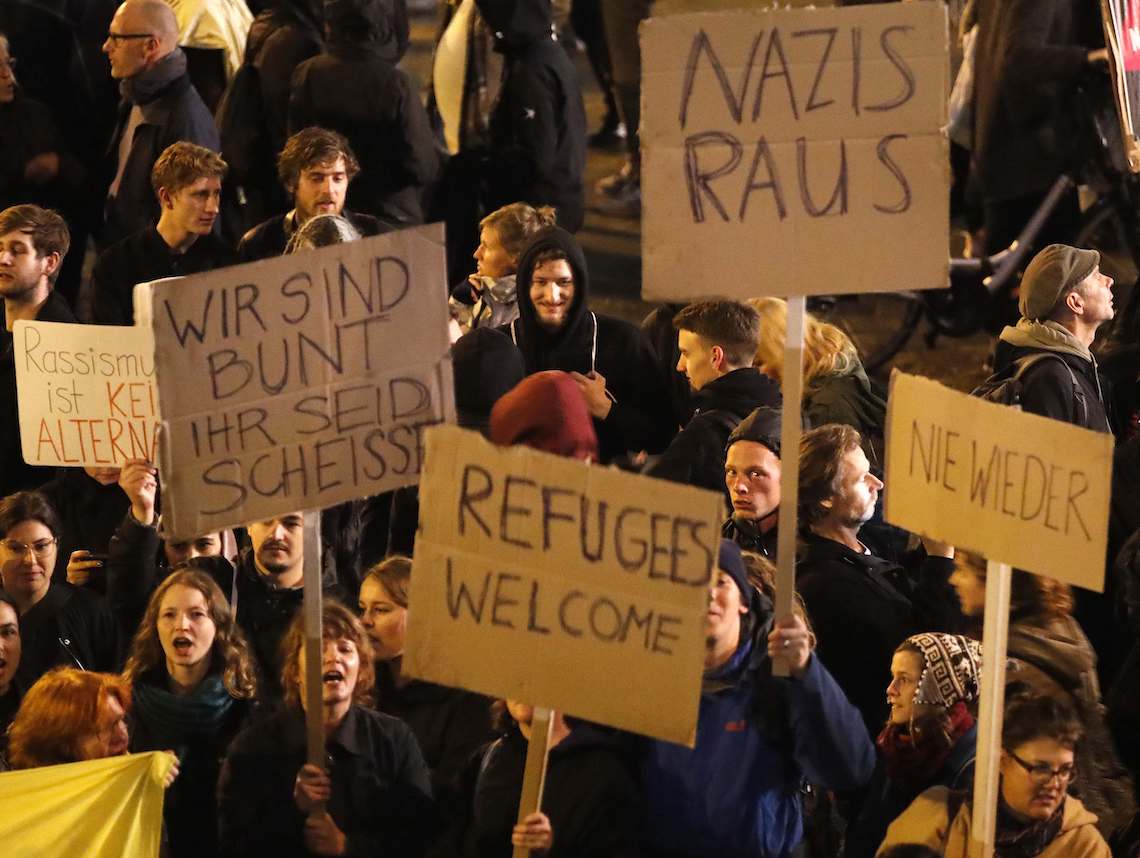 Demonstrators protest against the anti-immigration party Alternative fuer Deutschland (AfD) after German general election (Bundestagswahl) in Berlin, Germany, on Sept. 24. Photo by Wolfgang Rattay/Reuters
Demonstrators protest against the anti-immigration party Alternative fuer Deutschland (AfD) after German general election (Bundestagswahl) in Berlin, Germany, on Sept. 24. Photo by Wolfgang Rattay/Reuters There are many word combinations that justify a pause, and of these “Germany” and “rise of the far right” is at the top of the list. On Sept. 24, German Chancellor Angela Merkel won her fourth term as leader of the country. But her victory — according to most reports— was “dimmed by the entry of a far-right party into parliament for the first time in more than 60 years.”
What is the “far right”? For the left, the far right is often everything right of center. For the right, the far right is everything to the right of where I stand. In Europe, this means parties that support xenophobic policies, oppose immigration and use populist messages and blunt, often ugly language to gain the votes of citizens who feel that their country has been stolen away from them by forces beyond their control. In the specific case of Germany, this includes references to the second World War that should make anyone, especially the (mostly) Jewish readers of the Jewish Journal, cringe. It also includes the curious yet common phenomenon of far right, allegedly anti-Semitic European parties supportive of Israel.
The Alternative for Germany (AfD) party will enter the Bundestag, the German parliament, as the third biggest party. It will be an opposition party that promises to make Merkel’s life as miserable as it can. In a parliamentary system such as Germany’s, the exclusion of a large party complicates the political landscape and essentially forces on Merkel a certain coalition. Namely, it makes the other smaller parties — the ones that Merkel must appease to have a functioning coalition — more powerful.
There is no mystery surrounding the AfD’s achievement. This is, as Cas Mudde writes in the Guardian, “an anti-Merkel vote, reflecting opposition to her controversial Willkommenspolitik [the welcome policy] toward refugees, which not only pushed some voters of mainstream parties to switch but also mobilized previous non-voters.” Merkel decided to pursue an open door refugee policy. A controversial policy. Personally, she proved strong enough to pursue it and keep her seat. But it will be a less comfortable seat, next to a less appealing political neighbor.
Condemning the AfD is easy, and possibly necessary. Condemning AfD voters is also easy, and to a certain point, also necessary. Society should let voters of such parties know that some political deeds are beyond the pale of tolerable political choices. Still, understanding the rise of the AfD and its implications is much more important than condemnation. It is the natural result, the unintended yet to be expected consequences, of Merkel’s immigration policies.
Oftentimes, as possible implications of policies are weighed, the political backlash is not taken into account. Had Merkel known that her immigration policies would bring about the success of the far right, would she have still pursued them with such vigor? Would she have moderated them to mitigate such possible impact? If you feel detached from this question, try a local version of it: Had Barack Obama known that his immigration policies would bring about the victory and four-year term of Donald Trump as President (and no comparison of Trump to the AfD is intended), would he have made the same choices?
Policies have direct consequences, and they often have indirect consequences that are much more important. Some Israeli experts believe that Israel’s withdrawal from Lebanon in 2000 and the way it was done made the second Palestinian Intifada more likely. Of course, such a link is not easy to prove, but assuming it is proved, would it not completely alter our assessment of the decision to withdraw?
Back to Germany, the question of weighing the benefit of a policy and its possible unintended outcome is not an easy one to answer. Opening the doors to refugees is noble. The backlash, and we know this from history, can be dangerous. A leader is tasked with taking both these considerations into account. It ought not to burden his or her country with something that the country would not tolerate. It ought not to test his or her country with a policy whose result could be devastating.
Is it a devastating result to have AfD representatives sitting in the Bundestag? Much of it depends on whether this was a one-time show of protest or a beginning of a new trend. If it’s a one-time incident, Merkel could say that saving hundreds of thousands of refugees was worth the price. If this is the beginning of a new trend, Merkel could be remembered as the leader who recklessly pursued a policy that put Germany on a new unappealing path.





















 More news and opinions than at a Shabbat dinner, right in your inbox.
More news and opinions than at a Shabbat dinner, right in your inbox.